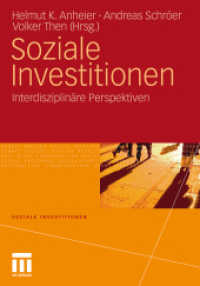- ホーム
- > 洋書
- > 英文書
- > Business / Economics
Full Description
This book provides the first systematic and accessible text for students of hospitality and the culinary arts that directly addresses how more sustainable restaurants and commercial food services can be achieved.
Food systems receive growing attention because they link various sustainability dimensions. Restaurants are at the heart of these developments, and their decisions to purchase regional foods, or to prepare menus that are healthier and less environmentally problematic, have great influence on food production processes. This book is systematically designed around understanding the inputs and outputs of the commercial kitchen as well as what happens in the restaurant from the perspective of operators, staff and the consumer. The book considers different management approaches and further looks at the role of restaurants, chefs and staff in the wider community and the positive contributions that commercial kitchens can make to promoting sustainable food ways.
Case studies from all over the world illustrate the tools and techniques helping to meet environmental and economic bottom lines. This will be essential reading for all students of hospitality and the culinary arts.
Contents
1. Introduction: the advantages of a sustainable kitchen. 2. Where does our food come from? 3. Climate-friendly food. 4. Local foods. 5. Organic food. 6. Sustainable foods: the importance of standards and certification. 7. Purchasing strategies and supply chains. 8. Healthy and sustainable foods. 9. Menu marketing, portions and presentation. 10. Making the most of your food; nose-to-tail and leaf-to-root eating, and packaging. 11. Efficient restaurants and kitchens. 12. The intelligent kitchen: using management systems to promote sustainability. 13. Minimizing waste: technology and management. 14. Minimizing waste: behaviour. 15. The restaurant in the community. 16. Conclusions and futures: expanding the restaurants and foodservice sustainability menu








